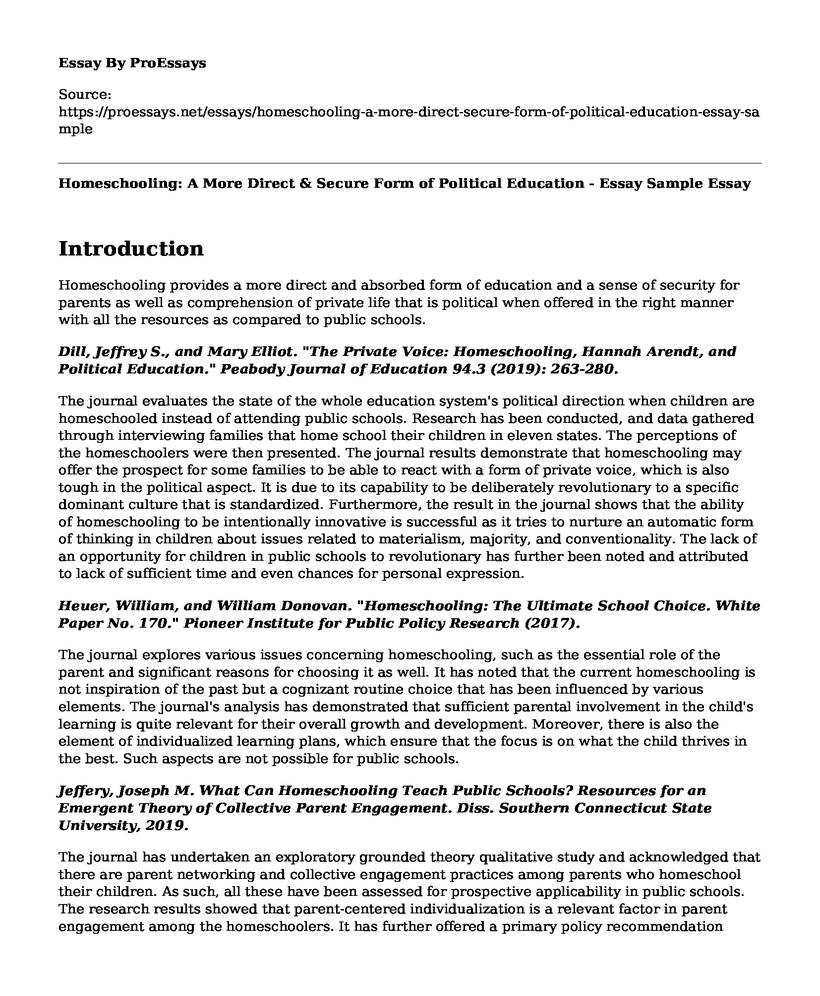Introduction
Homeschooling provides a more direct and absorbed form of education and a sense of security for parents as well as comprehension of private life that is political when offered in the right manner with all the resources as compared to public schools.
Dill, Jeffrey S., and Mary Elliot. "The Private Voice: Homeschooling, Hannah Arendt, and Political Education." Peabody Journal of Education 94.3 (2019): 263-280.
The journal evaluates the state of the whole education system's political direction when children are homeschooled instead of attending public schools. Research has been conducted, and data gathered through interviewing families that home school their children in eleven states. The perceptions of the homeschoolers were then presented. The journal results demonstrate that homeschooling may offer the prospect for some families to be able to react with a form of private voice, which is also tough in the political aspect. It is due to its capability to be deliberately revolutionary to a specific dominant culture that is standardized. Furthermore, the result in the journal shows that the ability of homeschooling to be intentionally innovative is successful as it tries to nurture an automatic form of thinking in children about issues related to materialism, majority, and conventionality. The lack of an opportunity for children in public schools to revolutionary has further been noted and attributed to lack of sufficient time and even chances for personal expression.
Heuer, William, and William Donovan. "Homeschooling: The Ultimate School Choice. White Paper No. 170." Pioneer Institute for Public Policy Research (2017).
The journal explores various issues concerning homeschooling, such as the essential role of the parent and significant reasons for choosing it as well. It has noted that the current homeschooling is not inspiration of the past but a cognizant routine choice that has been influenced by various elements. The journal's analysis has demonstrated that sufficient parental involvement in the child's learning is quite relevant for their overall growth and development. Moreover, there is also the element of individualized learning plans, which ensure that the focus is on what the child thrives in the best. Such aspects are not possible for public schools.
Jeffery, Joseph M. What Can Homeschooling Teach Public Schools? Resources for an Emergent Theory of Collective Parent Engagement. Diss. Southern Connecticut State University, 2019.
The journal has undertaken an exploratory grounded theory qualitative study and acknowledged that there are parent networking and collective engagement practices among parents who homeschool their children. As such, all these have been assessed for prospective applicability in public schools. The research results showed that parent-centered individualization is a relevant factor in parent engagement among the homeschoolers. It has further offered a primary policy recommendation whereby it is essential for public schools to develop programs aimed at supporting individualized and differentiated forms of engagement chances for parents. In this way, it will be easier for them to make a follow-up and further gauge the quality of education their children are being given in schools. Moreover, the journal has noted that homeschooling offers support for all the different abilities portrayed by children. The same should be communicated to parents of those in public schools to make the entire learning process efficient.
Kunzman, Robert. "Homeschooling and religious fundamentalism." International Electronic Journal of Elementary Education 3.1 (2017): 17-28.
The article explored the association between homeschooling and religious fundamentalism. It concentrates on their connection in the beliefs and practices of conformist Christian homeschoolers. The results show that homeschooling offers a perfect education environment to support various core principles of fundamentalists, which include resistance to modern culture, parental control, and importance, and suspicion of institutional power and professional proficiency. Another core principle is the linking of faith and academics. As such, all these are necessary for developing an all-rounded individual in society. Also, it has been noted that an exploration of these beliefs may be tough to undertake in public schools due to elements such as lack of time to focus on an individual learner.
Works Cited
Dill, Jeffrey S., and Mary Elliot. "The Private Voice: Homeschooling, Hannah Arendt, and Political Education." Peabody Journal of Education 94.3 (2019): 263-280.
Heuer, William, and William Donovan. "Homeschooling: The Ultimate School Choice. White Paper No. 170." Pioneer Institute for Public Policy Research (2017).
Jeffery, Joseph M. What Can Homeschooling Teach Public Schools? Resources for an Emergent Theory of Collective Parent Engagement. Diss. Southern Connecticut State University, 2019.
Kunzman, Robert. "Homeschooling and religious fundamentalism." International Electronic Journal of Elementary Education 3.1 (2017): 17-28.
Cite this page
Homeschooling: A More Direct & Secure Form of Political Education - Essay Sample. (2023, Aug 16). Retrieved from https://proessays.net/essays/homeschooling-a-more-direct-secure-form-of-political-education-essay-sample
If you are the original author of this essay and no longer wish to have it published on the ProEssays website, please click below to request its removal:
- The Brown Velvet Couch - Narrative Essay Sample
- Payment of College Athletes Essay Example
- Essay on California's Deadly Wildfires: A Burning Issue for U.S. Government
- Essay Example on Latin America's Industrial Revolution: Nationalism, Unlawful Force, and Conflict
- Personal Statement on Applying for a Ph.D. in Materials Science and Engineering
- Gov'ts Role in Advancing Sports: Domestic & Int'l Dev & Peace - Essay Sample
- Violence in Media: Adverse Effects on Children's Behaviour - Research Paper Sample







